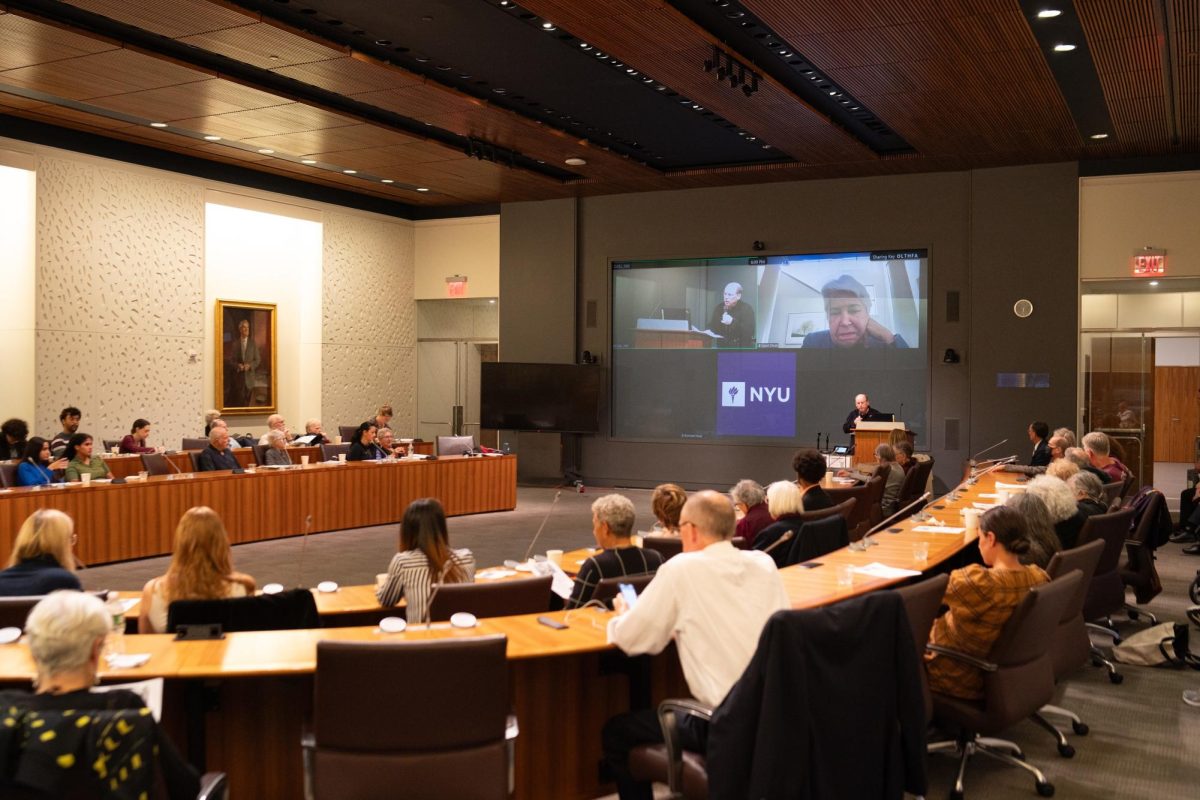Activists from NYU and the University of California, Berkeley joined a Wednesday night panel to discuss how student demonstrations in the 1960s’ free speech movement reflect ongoing tensions on college campuses amid the war in Gaza. The discussion, originally set to take place in Bobst Library, was relocated after an NYU administrator allegedly said that its speakers could not talk about student protests against the war.
At the event, speakers discussed restrictions on academic freedom and free speech on college campuses, including at NYU, and criticized the wave of mass student and faculty arrests that occurred last semester during pro-Palestinian demonstrations across the country. Panelists included two UC Berkeley alums who participated in protests against the Vietnam War on their campus in 1964, an NYU graduate student who was arrested last semester after participating in pro-Palestinian demonstrations at the University of Texas at Austin, and former chancellor of UC Berkeley.
“It appears that in this time of declining respect for free speech, arresting students protesting on behalf of an unpopular cause has become a first rather than a last resort on campuses like ours,” Steinhardt professor Robert Cohen, who hosted the event, said. “Student movements often raise unpopular demands, and in their quest for justice, peace and freedom, such movements challenge public policy in ways that upset the public.”
The event, hosted at the Global Center for Academic and Spiritual Life, commemorated the 60th anniversary of UC Berkeley’s free speech movement, which student protesters pioneered during the Civil Rights Movement of 1964 following university restrictions of political demonstrations on campus. Cohen claimed that the event was relocated after he refused to comply with NYU’s request that the content of the discussion exclude pro-Palestinian demonstrations this year. According to the university, the event “was never submitted” for approval.
Former UC Berkeley Chancellor Carol Christ — one of the only university leaders who did not allow police on campus in response to pro-Palestinian demonstrations last semester — said that creating programs for dialogue between all community members can heal tensions between administrators and students at universities.
“It is always a sad day when universities use police to break up student protests, and in my view, it often doesn’t resolve the situation,” Christ said in an interview with WSN. “The art and skill of leadership is to bring groups together in some workable resolution. It is a very hard world if people with principled, strongly differing opinions can’t talk with each other civilly.”
In February, NYU launched a series of events called “NYU in Dialogue” to educate community members about various perspectives on global issues, with many of this semester’s events relating to the war in Gaza. A university administrator previously told WSN that an event in the series was organized in response to the listening sessions held over the summer — which came after NYU leadership faced significant backlash for authorizing the New York City Police Department to sweep two pro-Palestinian encampments in Gould Plaza and outside the Paulson Center, leading to the arrests of dozens of students, faculty and alumni.
Free speech at NYU has also been flagged as “abysmal” by the Foundation for Individual Rights and Expression, which ranked the university third to last out of 251 college campuses. The organization cited the university’s censorship of invited speakers, artists and performers as contributing to its low ranking.
Bettina Aptheker, one of the speakers at the event and lead organizers of the 1964 movement at UC Berkeley, called NYU’s attempt to censor the event “a grave mistake” and criticized the university for its current handling of free speech on campus.
“No matter what your position is on what’s happening in the Middle East or what’s happening with Gaza, don’t use that as a way of suppressing opposition to it, because that’s the issue now,” Aptheker said in an interview with WSN. “The First Amendment is precious, and when you compromise it, ultimately it’s going to come back and bite you.”
Contact Mariapaula Gonzalez at [email protected].





















































































































































